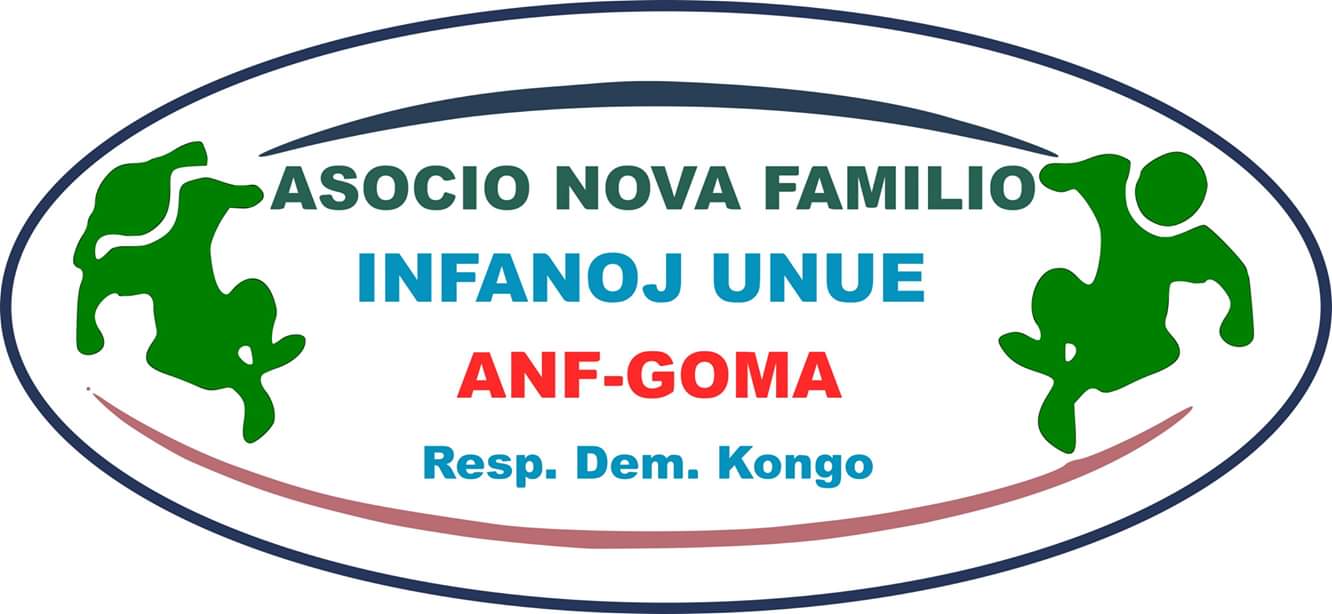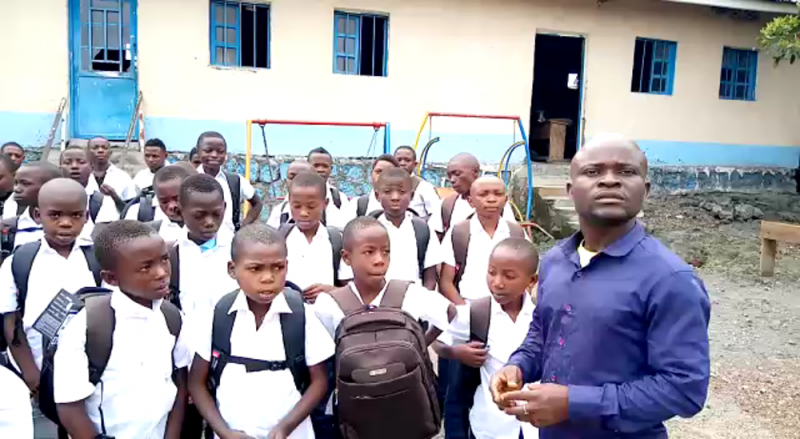Interview with Mr. Augustin Kakozwa
Interview with Mr. Augustin Kakozwa, director of Asocio Nova Familio (“New Family Association,” ANF), on the subject of his organization and its goals.

Q: Please tell us about the activities of ANF. How was it founded, and what are its goals?
A: Asocio Nova Familio is a charitable organization that operates in the city of Goma, Democratic Republic of the Congo. Its goal is to care for children who have lost their parents in the country’s civil wars.
ANF was founded a few years ago by local activists in the Esperanto Movement. When we arranged Esperanto courses for children, we discovered that many of the students were orphans who had fled their home villages due to the war and were living off the hospitality of foster families in our city. We decided to found an organization to help them. We pay for their education in schools and universities and work to improve their living conditions as much as we can.
Q: How did you find the children you now care for?
A: Most of them are students from our Esperanto courses. When we visit the families with which they are staying, we sometimes meet other children who wish to attend the courses, and they also become our students. Some students bring friends or acquaintances to join as well.
Q: How many students are there, and what are their ages?
A: Our students are between 6 and 20 years old. First and foremost we try to provide for the younger ones, but we also try to help those as old as 25 when possible. Through our visits to the host families we estimate that there are more than 200 children who currently need our assistance. Unfortunately, due to the state of our finances we have only been able to support around 130 for the 2020-21 school year.
Q: Could you explain your students’ situation in more detail? Readers outside of the DRC may not understand the local situation. How do orphaned children find families to host them, and what motivates these families to host them?
A: Fortunatey, the people of our country are standing in solidarity against the disasters that have been affecting us for so long. Many orphans take refuge with their relatives, and not a few families even host children who are not related to them. Unfortunately, these orphans often face difficulties, since the host families also have their own children to care for, and sometimes there is not enough to go around. Our organization is trying to fill this gap.
Q: What sort of school do your students attend? Is it public or private, and what do they learn there?

A: This year we are supporting the education of 110 orphans, of whom 65 are attending primary schools, 40 are in upper schools, and 5 are in universities. We try to find schools that are close to where they live, as crime, lack of money for public transportation, and frequent traffic accidents make longer trips unsafe. Unfortunately we still don’t have the capacity to transport our students to our Esperanto courses, so they have to come on their own, walking as far as 2 or 3 kilometers on foot. For most of them we have managed to arrange education in private schools, where teachers and classroom conditions are good, but some of them have to study in state-run schools, where they face many problems: due to lack of finances, as many as 100 people are crammed into a single clasroom, and teachers frequently strike because their salaries are not paid.
The subjects they study include mathematics, geography, history, etc. They learn French, the official language of the DRC, English, and also Swahili, which is their native language and also a lingua franca in much of East and Central Africa.
Five of our students are already studying at universities, where they have studied fields such as ship design, IT, finance, and business. One young woman is about to start education school, hoping to become a French language teacher.
Q: Why do you teach Esperanto? What does it provide to your students?
A: In general, we want to give them “cultural capital” that will, we hope, help them in their lives. One goal of our Esperanto instruction is to give them a base for more succesful learning of other languages that they will need. As I mentioned, Swahili is their native language and they speak it in everyday life; their only contact with French and English is in school. It is well known that language learning is easier when one has already experienced a foreign language. Esperanto has a logical and easily understood structure, and many of its roots are shared with French and English, so learning it helps prepare our students for successful acquisition of these languages.
Also, the community of Esperanto speakers includes hundreds of thousands of people in many countries. Knowledge of Esperanto will help our students communicate with members of this community and establish contacts that could prove useful in their work and lives.
Q: Please tell us some of your plans for the future.
A: We have a series of projects on file that we are trying to implement. First and foremost we want to improve our students’ living conditions. Many of them suffer from malnutrition, which sometimes means they cannot even stay awake during our Esperanto classes; they wear old, used clothes, and even these are sometimes unavailable.
So our first goal is to provide food to the students at our courses, and arrange to provide them with some food at home as well. We are also trying to provide them with clothing, and perhaps acquire sewing machines, which we would like to teach some of our students how to use, in order to provide clothing for the other students.
With regards to the transportation problem, we have plans to acquire a small bus, which we would use to take students to class. We might also use it to provide taxi service, giving the organization another source of revenue.
Q: Finally, could you say a few words to the readers? What would you like to communicate to them personally?
A: I send my greetings, and joy that, thanks to the help of our internet publicity team, I have been able to communicate with you. As you know, the people of our country are suffering due to our long civil war, but fortunately there are many among them who work stubbornly to make a future for themselves and for the generation to come. Now people across the whole world will know in greater detail about this activism. I am sure that this knowledge is a step towards collaboration. So I wish you all the best and hope that the work that results from this communication will show a way towards unity of those who seek to make the world a better place. If we work in common we can achieve our common goals.





